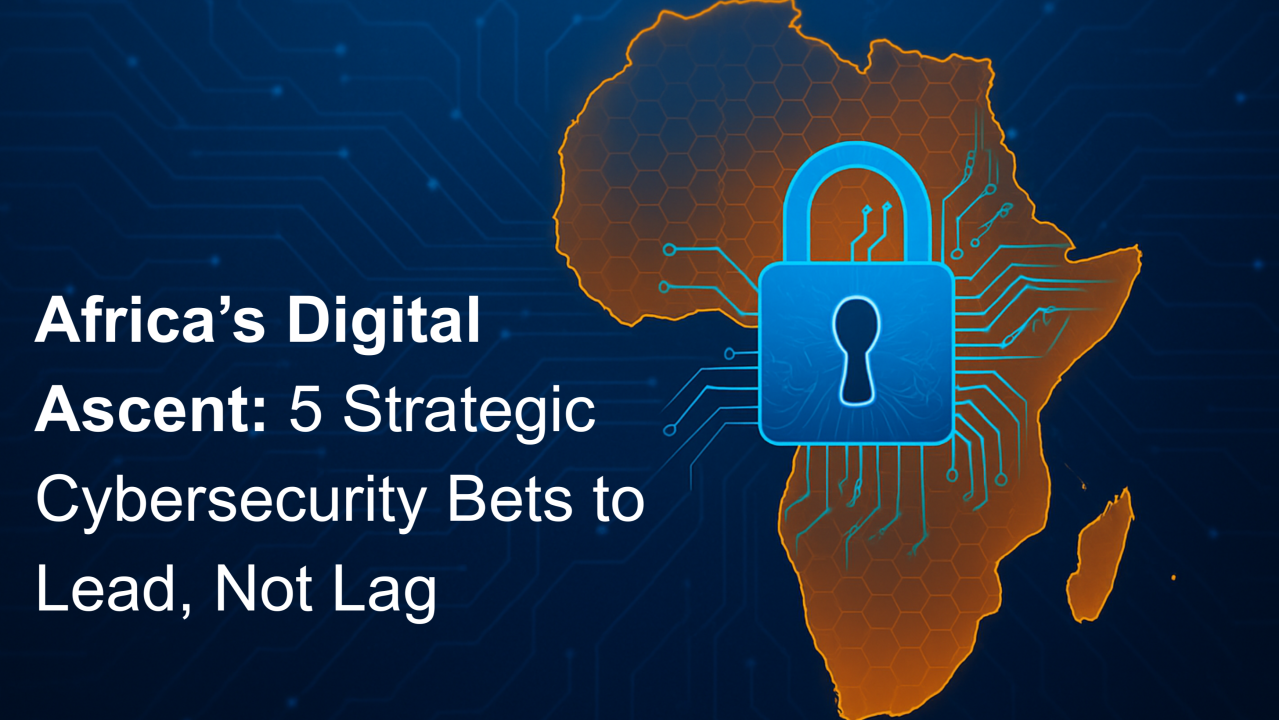This article was authored by Werner Lindemann CEO at DataGroupIT, as part of the Voices of DGIT thought leadership series.
Executive Summary
Africa’s digital revolution is accelerating. With over 600 million internet users projected by 2028 and mobile platforms transforming service delivery, cybersecurity is no longer a technical safeguard, it is a business-critical enabler of trust, investment, and digital transformation.
As the continent connects, exposure rises. Threat actors are evolving, regulatory environments are tightening, and the skills gap is widening. Cybersecurity must now move from the server room to the boardroom.
This article outlines five strategic bets every executive, policymaker, and technology leader in Africa should place today. These decisions will determine who thrives and who risks being left behind in the continent’s digital future.
1. AI-Driven Threats Are Rewriting the Risk Landscape
Artificial Intelligence is now a double-edged sword. While offering tremendous innovation potential, AI is also fuelling a new generation of cyber threats from synthetic phishing to voice spoofing and deepfake impersonations.
In 2024, financial regulators in Kenya, Nigeria, and Ghana flagged a rise in scams using AI-generated audio to mimic bank officials. These attacks blend local dialects and behavioural cues to manipulate victims at scale.
Insight: AI-enabled scams are up to 3x more successful than traditional phishing (Cybersecurity Ventures, 2024).
- Deploy AI-powered security platforms to detect language anomalies and behavioural deviations.
- Upskill frontline teams to recognize manipulation technique, not just malware.
- Update crisis communication plans for deepfake incidents targeting brands or leaders.
2. Data Sovereignty Will Reshape Cloud and Compliance Strategies
As more than 25 African nations enact or update data protection laws, data sovereignty is emerging as a board-level issue. Regulators in South Africa, Egypt, Nigeria, and Kenya are already enforcing local data residency mandates.
Global cloud providers, banks, and tech startups now face a patchwork of compliance rules that diverge from international norms, with real consequences for operational agility.
Insight: 74% of African CIOs cite regulatory complexity as a top barrier to cloud adoption (IDC Africa, 2024).
Executive Response:
- Audit all data flows for jurisdictional compliance risks.
- Explore sovereign cloud solutions aligned with national policies.
- Proactively engage regulators to help shape pragmatic, innovation-friendly frameworks.
3. Zero Trust Will Become the New Normal
Perimeter-based security is obsolete. With hybrid work, SaaS sprawl, and distributed infrastructures, Zero Trust Architecture (ZTA) which verifies everything and trusts nothing ,is quickly becoming the global gold standard.
In Africa, adoption is rising across finance, telecom, and public sector environments driven in part by insurers who now require ZTA as a condition for coverage.
Insight: Only 17% of African firms have fully adopted ZTA, but 61% plan to within 36 months (Palo Alto Networks, 2025).
Executive Response:
- Launch a phased Zero Trust roadmap, starting with IAM.
- Introduce microsegmentation and least-privilege access across teams.
- Choose cybersecurity vendors offering low-friction, Africa-ready ZTA solutions.
4. Talent Will Define the Continent’s Cyber Readiness
Africa faces a growing cybersecurity skills shortage, with more than 500,000 roles unfilled continent-wide. This isn’t just an HR issue, it’s a systemic vulnerability.
Without a local talent pipeline, critical systems go unprotected, incidents take longer to detect, and risk snowballs.
Insight: 72% of African businesses report that cyber talent shortages have delayed security projects (ISC², 2024).
Executive Response:
- Build internal academies to train and grow cybersecurity professionals.
- Partner with universities and government on certification pipelines.
- Create Centres of Excellence to anchor talent regionally and retain IP.
5. Quantum Threats Demand Pre-Emptive Action Today
Quantum computing may be years away from practical attacks but the threat is already real. Bad actors can store encrypted data today and crack it tomorrow with quantum power (“store now, decrypt later”).
With governments digitizing everything from ID systems to health records, Africa cannot afford to be reactive.
Insight: 60% of global CIOs plan to begin quantum risk assessments by 2026 (Gartner, 2025). Africa should not fall behind.
Executive Response:
- Classify long-term confidential data and assess encryption risks.
- Begin early transition planning toward post-quantum cryptography.
- Join global working groups to track PQC standards and timelines.
Conclusion: A Defining Moment for Cyber Leadership in Africa
Cybersecurity is no longer about chasing global best practice, it’s about shaping our own.
The next three years will define whether Africa leapfrogs legacy security models or becomes a soft target in the new digital economy. The five bets outlined here are not optional, they are foundational.
Strategic Bet Summary
- AI-Powered Threats: Highest risk disruptor, requires people, process, and tech response
- Data Sovereignty: Cloud, storage, and vendor strategy must align with compliance realities
- Zero Trust Architecture: Emerging gold standard , insurance-backed and regulation-driven
- Talent Development: Critical enabler for national resilience and economic continuity
- Quantum Readiness: A long-term imperative that must start today
As leaders, we are custodians of trust. Our decisions today will determine how well Africa defends its digital future and who leads in the Fourth Industrial Revolution.

